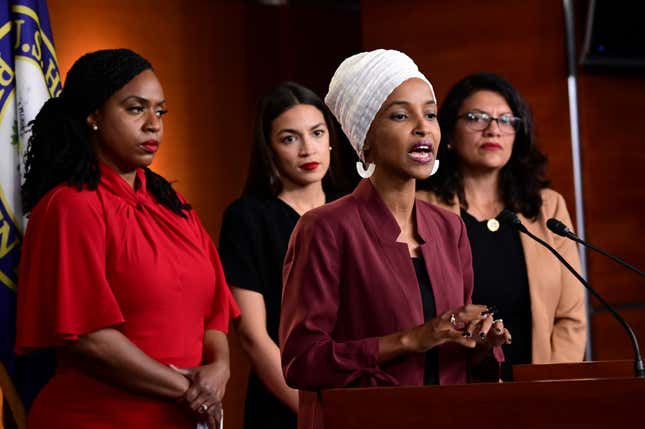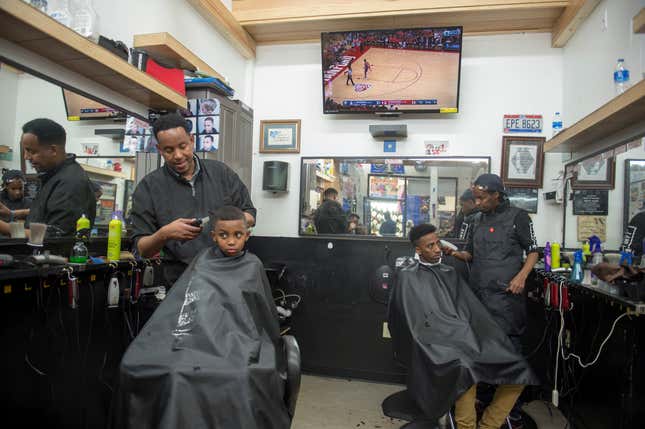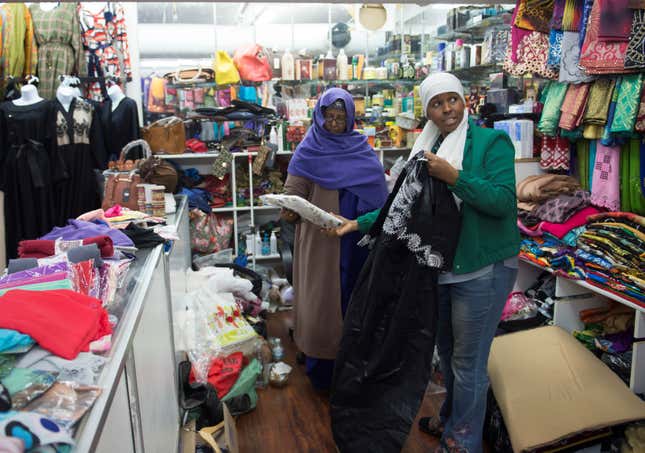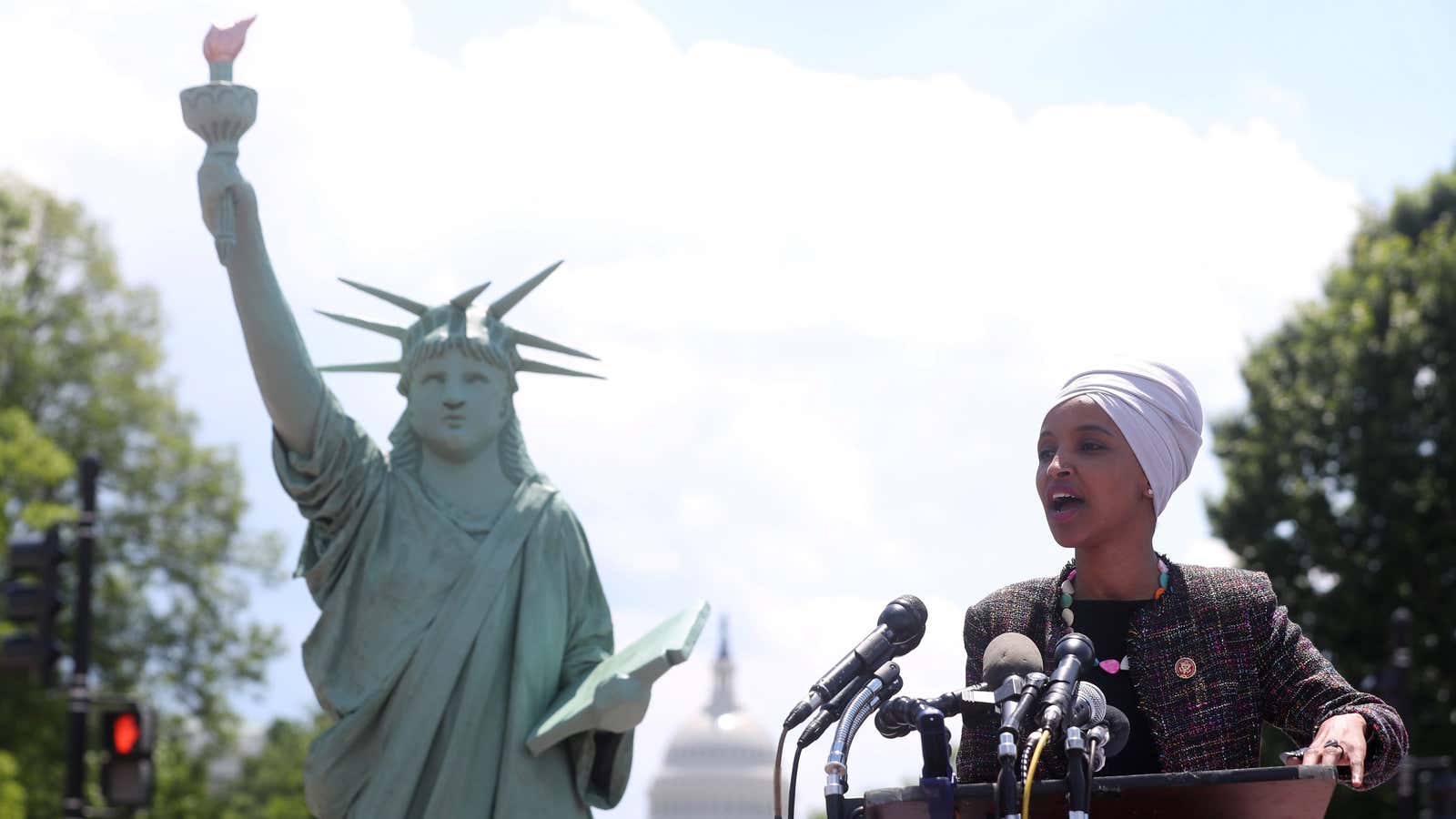It was a glorious homecoming that ended a turbulent week facing off with the most powerful man in America.
On Thursday (Jul. 18), Minnesota congresswoman Ilhan Omar returned home following a week in which president Donald Trump targeted her immigration status, religion, and ethnicity. Trump falsely accused the first-time representative of supporting the terrorist group al-Qaeda and said she “smeared” US servicemen who fought in Somalia in the 1990s. He also drew attention to rumors that she married her brother and might have committed immigration fraud—allegations Ilhan has called “absurd and offensive.”
At the Minneapolis-St. Paul airport, however, the Somali-born Democrat faced a doting crowd chanting “Welcome home” and “We have your back”—a sharp contrast to the “send her back” chorus that erupted at a raucous Trump rally in North Carolina just the day before.
For the Somali community in the North Star state, Trump’s continued rhetorical assault showcased his efforts to scapegoat them for political expediency and extend the prejudice they already face because of their identity and religion. But in Ilhan’s sustained defiance against Trump, they say they have found not just a voice to defend them on the national and global stage but also the temerity to claim their place in their new homeland.
“It’s a fight for our democracy,” says Ahmed I. Yusuf, author of Somalis in Minnesota. Ahmed says he was “disgusted” to hear Trump label Ilhan as pro al-Qaeda, adding the president has “declared a war against everyone but the entrenched white supremacists.”
More than anywhere else in the United States, tens of thousands of Somalis have settled in the mid-western US state after fleeing the civil war in Somalia. There, they have established businesses, carved a niche in local elective politics, and have continued to send millions of dollars back home to support family and friends. But even as they have tried to assimilate, they have faced a backlash not just from Trump but also from white anti-immigration activists who have increasingly pushed an explicit anti-Muslim agenda.
Ilhan’s historic election in 2018 as the first Somali refugee and one of two Muslim women in Congress dovetailed with Trump’s era and the rise of populism and nativism. From the beginning, she’s had to battle fake news about her personal and political past, while Trump’s attacks against her and three other female lawmakers of color have led to calls to increase her security.

The president’s inflammatory messages have exposed the Somali community, says Jaylani Hussein, executive director of the Minnesota chapter of the Council on American-Islamic Relations (CAIR). Besides getting threats about Ilhan, he says there has been an uptick in bias crimes including the case of a man who hosed Somali teenagers while yelling racial slurs; another who pulled a gun on Muslim teens in a McDonald’s; as well as a woman who was pepper-sprayed.
Even with the spike in crimes, Jaylani believes it’s not “even 10% of what is happening” since most incidents go unreported. And while the increased “Islamophobia in the public realm” is unfortunate, he says this will only push them to defend Ilhan Omar, Muslims, and Somalis even more. “Every time we are threatened, we organize more.”


Uniting everyone
Beyond standing up to Trump, some in Minnesota are also working to relieve the tension brewing among different communities. Watching Ilhan speak to supporters at the airport, “I was in tears,” says Natalie Ringsmuth, executive director of non-profit Unite Cloud. “She gave me a lot of hope in her statements, and people coming in support of her gave me a lot of hope.”
Unite Cloud specifically works in St. Cloud, a city located in central Minnesota which has experienced a huge influx of Somali immigrants, leading to religious and racial clashes. Ringsmuth says some of her friends have been called the N-word, been told to go back to “where you came from,” and have been asked by strangers to take off their hijab if they were “really not oppressed.” In trying to shift minds, Ringsmuth is creating spaces to allow people from both sides of the chasm to share their personal stories.
This shift in understanding should also happen with how the media covers immigrants like Ilhan, says Mukhtar Ibrahim, a journalist who recently kickstarted the Minnesota-based, immigrant-focused outlet Sahan Journal. “What she says should be the focus of the coverage instead of her identity,” he argues.
For now, Ilhan remains a bulwark of strength for her community and an emblem of success in a young immigrant community. While he’s worried about the long-term impact of the president’s assault on the congresswoman, the writer Ahmed says Ilhan’s rise will only push the community to remain engaged in local and national politics. “We are going to be active.”
Sign up to the Quartz Africa Weekly Brief here for news and analysis on African business, tech and innovation in your inbox
